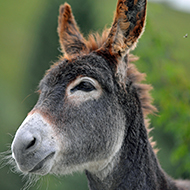EVJ and EVE create virtual donkey collection

"Animal welfare continues to be the major concern with donkeys and mules around the world." - Karen Rickards, guest editor.
The Equine Veterinary Journal (EVJ), alongside Equine Veterinary Education (EVE) has produced a virtual collection of articles on donkey medicine and welfare.
Free to view until 29 October 2021, the collection is titled 'Recent Advances in Donkey Medicine and Welfare', and covers topics on pharmacology, diagnostics, disease prevalence and management practices relating to donkeys as working, companion and production animals.
The collection responds to a need for further accessible information on donkey medicine and welfare, and EVJ editor Professor Celia Marr commented on this: “This impressive collection shines a spotlight on the important advances that have been made to donkey medicine and welfare and helps us to identify the research gaps yet to be filled.
“By sharing this work, we aim to improve disease prevention and enhance the welfare of donkeys around the world as well as highlight the continued importance of owner education and improve the public perception of this enduring species.”
Topics covered in the 21 papers include preventative healthcare, the use of Equid Assessment Research and Scoping (EARS) tool in Mexico, owner involvement in disease awareness, decision-making surrounding treatment options, the availability of accurate diagnostic testing, and zoonotic risk, among others.
In an introduction to the collection, guest editors Karen Rickards and Ramiro Toribio said: “One area that needs research emphasis is the generation of pathophysiological information. Donkey-specific medical knowledge in the literature is sparse.
“In this virtual issue, Equine Veterinary Journal (EVJ) and Equine Veterinary Education (EVE) combine forces to provide a great opportunity to showcase advances made in this area whilst encouraging the reader to consider where further research is required.”
“Tt has been a huge privilege to review the recently published literature from EVJ and EVE on the prevalence, diagnosis and management of diseases in donkeys. It is encouraging to see the advances made in donkey-specific medicine and the potential impact of the articles published in this issue.
“There is however still a lot more to understand about the idiosyncrasies of donkeys that would help to support clinicians in the diagnosis and management of diseases in this species.
“Likewise, we should not underestimate the impact that owner and veterinary education, provided by well-designed research driving evidence-based medicine, can have on the welfare of donkeys around the world.”
The collection is available here, and is free to read until 29 October 2021.



 The RCVS has announced a new version of its 1CPD mobile app, with enhanced features for veterinary surgeons and veterinary nurses to record their continuing professional development.
The RCVS has announced a new version of its 1CPD mobile app, with enhanced features for veterinary surgeons and veterinary nurses to record their continuing professional development.